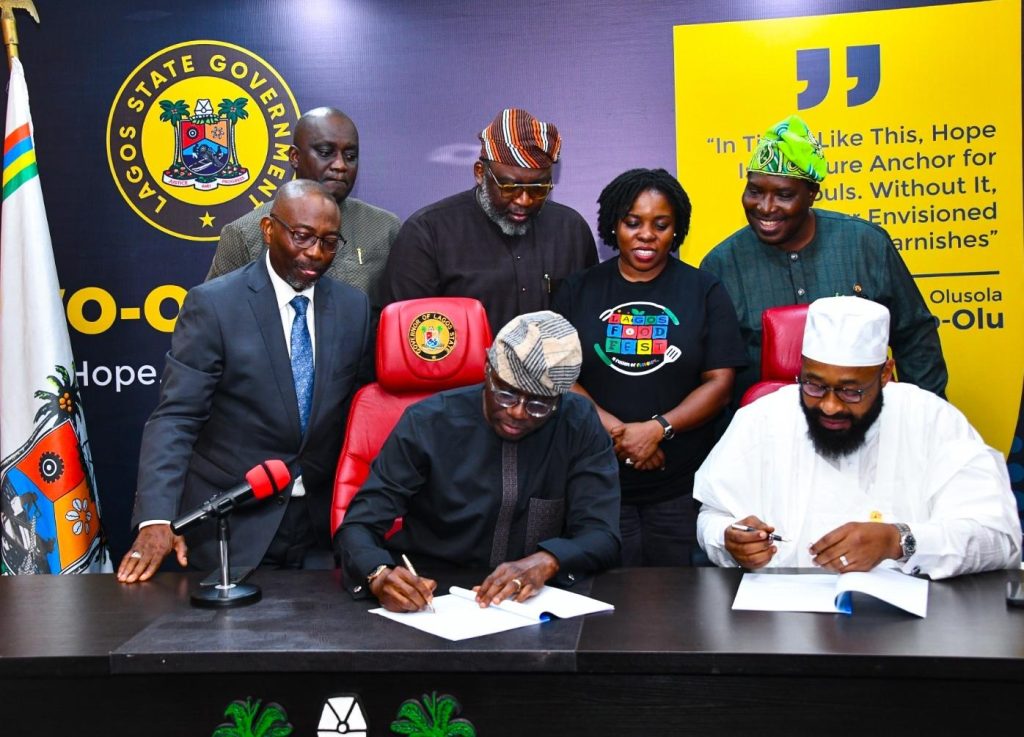Lagos seals partnership with Niger for agric commodities supplies

![]()
• Sanwo-Olu, Bago sign mou for Produce for Lagos Initiative

Photo
Governor of Lagos State, Mr. Babajide Sanwo-Olu and his Niger State counterpart, Governor Mohammed Bago signing a MoU on Agriculture at the Lagos House, Marina, on Wednesday, 06 March 2024. With them from left: Lagos Commissioners, Mr. Lawal Pedro, SAN (Attorney General & Justice); Hon. Olanrewaju Layode (Home Affairs); Mr. Ope George (Economic Planning & Budget); Ms. Abisola Olusanya (Agriculture), and Dr. Rotimi Fashola (Special Adviser, Agriculture).
Lagos State Government, on Wednesday, brokered a strategic partnership with Niger State — a sub national entity with the largest agricultural farmland in the country — towards enhancing food production and security.
Governors of the two States signed a Memorandum of Understanding (MoU) in Lagos for a cooperation geared towards exploring their comparative advantages in order to facilitate constant supply of agricultural commodities for the end consumers.
The agreement tagged “Produce for Lagos Initiative” is part of the efforts of the two parties to key into the Emergency Food Security Initiative declared by President Bola Ahmed Tinubu to cultivate thousands of hectares of land to sustain food production and supply chain.
This arrangement is a long term strategic partnership between the two States in building competencies around their areas of strength. While Lagos is positioned as a ready organised food market for consumers, Niger has its core strength in arable land for agriculture and food production.
The signing of the agreement will be followed by massive supply of fresh farm produce to the Lagos Food Logistics hubs for storage and distribution.
Gov. Babajide Sanwo-Olu and his Niger State counterpart, Mallam Umar Mohammed Bago, signed the contract on behalf of the parties.
Sanwo-Olu said: “We have just put the pen to paper and signed the Government-to-Government agreement between Lagos and Niger states for agricultural production. Lagos, being the smallest State in terms of landmass, and Niger, being the largest State, is no coincidence that the biggest and the smallest are looking for at opportunities to citizens of our both states to be the beneficiaries of this historic partnership.”
Gov. Bago described the partnership as “a landmark” for both parties, noting that the North Central state was willing to leverage organised market in Lagos to boost economic activities in his State.
He said: “This is a landmark agreement that has been made today. Lagos is the largest consumer of agricultural resources in the country based on its population, while Niger State has the largest agricultural land. So, this Memorandum of Understanding came on the heels of exploring the strength of each state to promote food security and safety.
“Niger State is to produce agricultural commodities for Lagos State, and also process staple food items. Lagos State is to leverage the organised market and supply chain to meet consumers’ demands. This is basically the simple explanation of the Memorandum of Understanding, which is in tandem with Mr. President’s food security agenda.”
Lagos Commissioner for Agriculture, Ms. Abisola Olusanya, noted that the arrangement would help in price stability, as the MoU accommodated pre-production contracts in the value chain to enable farmers cut costs and improve output.
She said the first phase of the Food Security Systems and Central Logistics Park being built in Ketu-Ereyun, Epe would be commissioned in December to warehouse the large supplies from Niger State. In the meantime, she said the existing middle level hubs would be used as distribution points for the supplied commodities.
“This is a marriage made in heaven for our two States. This is a function of production meeting markets. Once there is an off-take market, it would catalyse the production end of the market. Then, this will lead to price stability and food availability.
“Farmers’ profit will also be guaranteed, just as consumers will be happy for timely supplies. We will also have middle men who will have regular sources of income by acting as a bridge between both ends of the market.”
Some of the agricultural commodities to be produced and shipped to Lagos markets include staple foods, rice paddies, tubers, beans, legumes, maize and grains.




